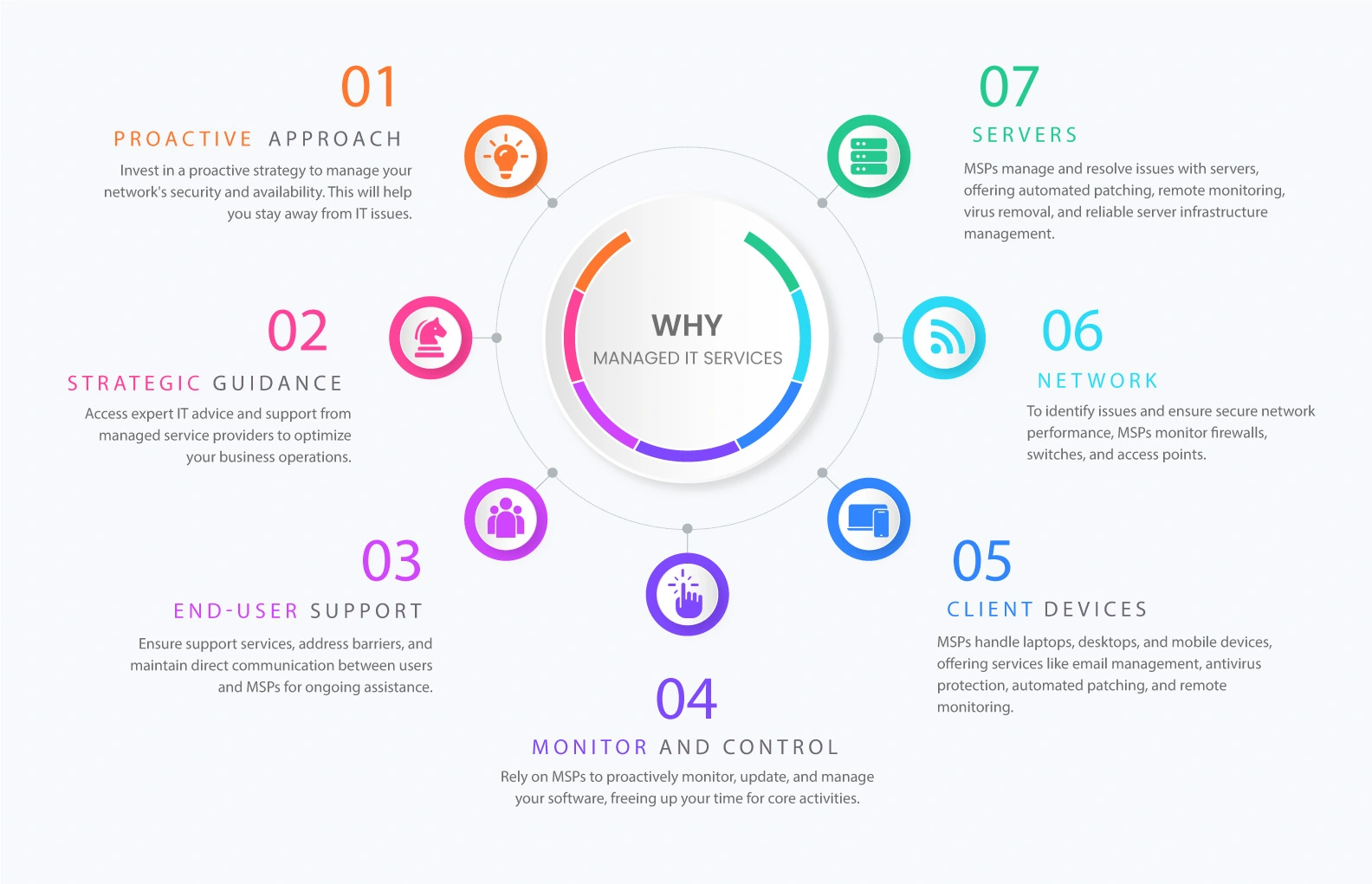What are The Benefits Of Managed IT Services
Managed IT Services: Benefits, Key Elements & Services
With the ever-increasing shift towards digitization, businesses of all sizes are gearing up to rely more and more on IT infrastructure to streamline and enhance their business operations. Given the lack of IT-specific roles in most organizations, it is not surprising that the maintenance and management of complex IT infrastructure environments can be challenging. This is why these businesses have come to depend more upon managed IT service providers to handle these needs. Many business leaders and industry players have recognized that IT service management is a crucial aspect of modern businesses. Managed IT services have predictably become a growing trend in recent years. Here, we will go over the many types of managed IT services, the key elements of these kinds of services, and the benefits of Managed IT Services.
What are Managed IT Services?
Managed IT services refer to the practice of outsourcing the management and support of an organization's IT infrastructure to a specialized third-party provider. These providers, known as managed service providers (MSPs), take on the responsibility of monitoring, maintaining, and securing the IT systems and networks of their clients. Unlike traditional IT support models where businesses rely on in-house IT teams or ad-hoc external support, managed IT services provide a proactive and comprehensive approach to IT management. MSPs leverage their expertise, tools, and resources to deliver a range of services tailored to meet the unique needs of each client.

Benefits of Managed IT Services
1. Proactive IT Management
Managed IT services adopt a proactive approach to IT management. MSPs continuously monitor and manage IT systems, identifying and addressing potential issues before they escalate into major problems. This proactive monitoring helps minimize downtime, improve system performance, and enhance productivity.
2. Expertise
By partnering with a managed service provider, organizations gain access to a team of skilled IT professionals with expertise across various domains. MSPs employ specialists in areas such as security, cloud computing, networking, and application management. This breadth of expertise allows organizations to leverage the latest technologies and best practices without having to invest in training or hiring additional staff.
3. Scalability
Furthermore, managed IT services provide scalability, allowing businesses to easily scale up or down their IT resources as their needs evolve. This is especially useful for organizations that prefer to be lean but have to sporadically upscale their capabilities depending on the needs of new customers and market demand.
4. Cost Savings
Outsourcing IT management to a managed service provider can result in significant cost savings. By partnering with an MSP, businesses avoid the expenses associated with maintaining an in-house IT infrastructure, such as hardware and software investments, maintenance costs, and staff salaries. Managed IT services typically operate on a subscription or pay-as-you-go model, allowing organizations to have predictable and optimized IT expenses.
5. Focus on Core Business
By offloading IT management to a trusted partner, organizations can focus their resources and energy on their core business objectives. With the burden of IT management taken care of, businesses can dedicate more time and effort to strategic initiatives, innovation, and improving customer experiences. This increased focus on core business activities can drive growth, competitiveness, and overall success.
6. Faster Response Times
Managed IT service providers are responsible for saving a lot of time for their client organizations by responding to any issues or bottlenecks as and when they are encountered, either by the client or by the end-users. They take steps to create monitoring systems that can be automated and tailored for instantaneous responses so as to ensure the smooth running of IT infrastructure.
7. Point of Contact for Vendors
Most managed IT service providers have insider knowledge of where to source IT-related equipment and software for bargain deals and favorable terms. With their knowledge of useful vendor contacts, client organizations need not search any further for custom IT infrastructure needs.
7. Point of Contact for Vendors
Most managed IT service providers have insider knowledge of where to source IT-related equipment and software for bargain deals and favorable terms. With their knowledge of useful vendor contacts, client organizations need not search any further for custom IT infrastructure needs.
Also, Read the Benefits of Partnering with MSPs
Services Included in Managed IT Services
Some of the key types of managed IT services from Vofox Solutions INC include:
Managed Security: With cyber threats becoming increasingly sophisticated, organizations need robust security measures to protect their sensitive data and systems. Managed security services involve implementing and managing security solutions such as firewalls, intrusion detection systems, antivirus software, and vulnerability assessments. MSPs continuously monitor and respond to security incidents, ensuring that the organization's IT environment remains protected against potential threats. Cybersecurity threats are a major concern for organizations of all sizes. MSPs stay up-to-date with the latest security threats and implement proactive measures to mitigate risks. This helps organizations protect their sensitive data, maintain regulatory compliance, and safeguard their reputation.
Managed DevOps: DevOps combines development and operations to streamline the software development lifecycle. Managed DevOps services assist organizations in implementing and managing DevOps practices, tools, and workflows. This includes tasks such as continuous integration, automated testing, deployment automation, and infrastructure management. By leveraging managed DevOps services, businesses can accelerate software delivery, improve collaboration between teams, and achieve higher levels of efficiency and quality.
Managed Application Services: Applications are at the core of modern businesses, enabling critical functions such as customer relationship management, enterprise resource planning, and communication. Managed application services involve the monitoring, maintenance, and support of these applications to ensure optimal performance and availability. MSPs handle tasks such as application updates, patch management, performance optimization, and user support, allowing businesses to focus on their core operations.
Managed Cloud Services: Cloud computing has revolutionized the IT landscape by providing scalable, flexible, and cost-effective solutions. Managed cloud services involve the management of an organization's cloud infrastructure, including public, private, or hybrid environments. MSPs handle tasks such as cloud migration, infrastructure provisioning, performance monitoring, data backup and recovery, and security management. By leveraging managed cloud services, businesses can harness the power of the cloud while offloading the complexity of managing the infrastructure.
IT Help Desk: An efficient IT help desk is essential for addressing user issues and ensuring smooth IT operations. Managed IT services often include a dedicated IT help desk that provides technical support to end users. This includes handling user inquiries, troubleshooting technical problems, resolving software and hardware issues, and providing guidance on IT-related matters. A well-managed IT help desk ensures prompt and effective resolution of user concerns, minimizing disruptions and maximizing productivity.
Disaster Recovery: Disruptions such as natural disasters, hardware failures, or cyber-attacks can severely impact business operations. Managed IT services encompass disaster recovery solutions to help organizations recover from such incidents quickly. This involves developing and implementing comprehensive backup strategies, replicating critical data and systems, and establishing recovery procedures. MSPs ensure that organizations have robust disaster recovery plans in place, minimizing downtime, data loss, and financial losses.
Also, Know how to Create a Solid Cyber Security Threat management
Final Thoughts
In conclusion, managed IT services provide organizations with a comprehensive and proactive approach to IT management. By outsourcing IT responsibilities to specialized providers, businesses can benefit from expert knowledge, scalable solutions, enhanced security, and cost savings. The key components of managed IT services, including managed security, DevOps, application services, cloud services, IT help desk, and disaster recovery, work together to ensure the smooth functioning of IT infrastructure and enable organizations to focus on their core business objectives. Partnering with a trusted managed service provider like Vofox can be a strategic decision for businesses seeking to optimize their IT operations, drive innovation, and stay ahead in today's rapidly evolving digital landscape.
Vofox has a team of specialists who have provided managed IT services for many industrial players in the fields of education, aviation, and the like. With our seamless cloud infrastructure capabilities and DevOps expertise, clients can be assured that they receive the best results when approaching us for any of their IT needs. Our continued support can reduce your risks and bring down your labor costs dramatically when it comes to coordinating the functions of your internal IT infrastructure. Contact us today to get an understanding of how our managed IT services can boost your business output and streamline your core operations.



